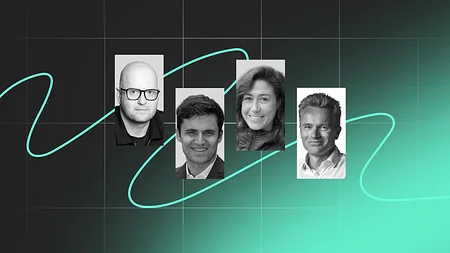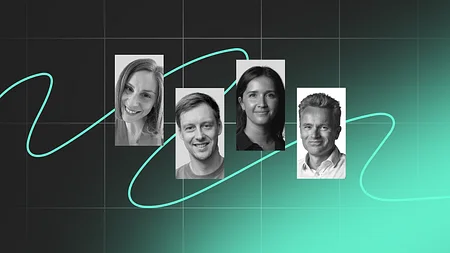Avoka's Derek Corcoran on banking pain points and best practices
Derek Corcoran, CEO (Chief Experience Officer, not Chief Executive) at Avoka, paid a flying visit to 11:FS, straight off the plane from Colorado, for a Fintech Insider interview with Simon Taylor.
Listen to the interview in full here, stream it below or read on for the highlights.
Simon and Derek start off by introducing Avoka (pronounced Av-OH-kah) to our audience. They are a software company providing “banks with a platforms that allows them to build acquisition experiences” - in simple terms, white label solutions that can provide better customer user experiences that sit on top of the bank's tech stack that doesn’t disrupt the backend systems but which provide their customers with a better user journey, from on-boarding to payments. This is incredibly popular with the bigger banks where innovation, tech development and new user journeys can be an arduous and drawn out process. Corcoran tells us: “three of the top ten global banks are using our product, and what they like is that we give them the flexibility to be able to build the experience that they want to build, but they don't have to build it from scratch.”
They also have a marketplace of pre-built solutions and integrations so that banks and financial service providers can pick and choose the solution that works best for them and fits in best with their existing vendors.
“One of our clients took 18 months to build a new credit card application experience in-house. It was going to take them another 18 months to do deposits, and it took them four months to do the equivalent with their deposit account with us.”Derek tells Simon they have 50 clients in the financial services sector, out of their 80-strong client base, and their main value proposition is the ability to bring their clients into the market faster with the UX solutions Avoka can offer. The culture at Avoka is 'we are going to be successful by making our clients successful', and indeed Derek talks about a meticulous iteration process of creating product after product that aims to satisfy their clients as much as possible, and in turn satisfy the customers they are trying to bring on board. Data analytics are central to these iterations, creating analytics engines which show Avoka where in the application flow the customer is lost. This is imperative to the evolution of their products but also the specificity to each client- they can use this data to show banks exactly what they're missing, and exactly how they can improve upon that.
Common pain points with banking UX
Conversation turns to the pain points banks go through when trying to update any part of their user journey, and how easy or otherwise is it for Avoka to approach banks and suggest their product as a means of improving the bank's customer experiences. Derek explains how banks are so overstretched and resource-constrained that they can’t keep up with the rate of change happening around them, so they’re very open to conversations and solutions that can help: “Payments is changing, mobile banking experiences is changing, voice, artificial intelligence, they're dealing with all of this. And then, you've got the product teams inside the bank saying, 'Well, hang on a second. My application experience for a home loan is terrible. My application experience for a current account is terrible. You need to fix that.' And so, when we go in and say, 'Look, we can help you. You get to use our platform, we're not going to do the work for you. We'll help, but you're going to use our platform to get to market faster with that thing you're looking for,' they're happy to have that conversation.” They talk about the rate of development and change in the industry and the importance of the creation of APIs to deliver fast paced innovation and change, which is not valued enough - “I think one of the biggest changes that, to a large extent, is kind of downplayed in the industry, is the advent of the API. That's the glue, that's making all of this stuff possible”. APIs allow Avoka’s platform to make changes and create different user experiences for bank’s customers without changing the core fabric beneath, Derek describes it as a complementary relationship, Avoka does not provide the record-keeping, data-holding part of a bank, but more specifically “the bit that touches the customer” - “We are not the system of record, we are not the long-term storage. We are the system of engagement. We're the bit that touches the customer.” They describe themselves as offering modular solutions that banks can plug in as and when they want without disturbing the core system at the heart of banks, which is the hardest element to change.“I think one of the biggest changes that, to a large extent, is kind of downplayed in the industry, is the advent of the API. That's the glue, that's making all of this stuff possible”
Banking best practice and Lego building blocks
Simon asks Derek about best practice, what is the best way to go about innovating, and what isn’t. “Don't try and build everything yourself!” says Derek, going on to qualify this with “as I said, with that kind of resource contention, or resource constraint that the banks are experiencing at the moment, it's just too hard, it’s going to take too long and you’re going to lose a whole bunch of customers… Customers aren’t waiting, it’s too easy to shop around.”“Don't try and build everything yourself!...Customers aren’t waiting, it’s too easy to shop around.”He goes on to use a Lego analogy to describe the figurative or literal “building blocks” of banking technology, to explain how it was previously tricky with multiple small parts and now the building blocks are bigger, easier and it takes far less time to build your product: “A lot of the banks still operate like the kind of Lego that I used to play with as a kid, which was just rectangles and squares and, if you wanted to build a spaceship, it took three hours. But now, Lego is the front and the back of a spaceship and two wings and I've got a spaceship in 15 minutes. So, we're seeing that more of those big Lego building blocks are available to the banks, to help try and accelerate, because they need to move.”
"We're seeing that more of those big Lego building blocks are available to the banks, to help try and accelerate, because they need to move.”Another best practice tip he gives is to involve legal and compliance teams as early as possible to ensure they are involved and informed in all developments rather than, in his words: “Let's figure out what we want to do and then run it by them....They react badly to that, and then they become a blocker”.
Chief Experience Officer
Moving away from Avoka in general to Derek more specifically, Simon asks what does a Chief Experience Officer actually do? It’s not a common job title, they joke that on paper it reads like "CEO" but without the responsibility. The actual role we learn is split in three component parts, thought leadership, product development and strategic client management. In greater detail we are told thought leadership involves keeping his fingers on the pulse of industry changes and best practice; product developments involves working with the product team in order to have best practice solutions available in the marketplace to offer their clients; and then finally maintaining strong working relationships with the biggest strategic clients. Although Derek does concede that it’s a job title he made up for himself.Careers Advice
Finally, for the last part of the interview Simon moves away from Derek’s specific role, to the advice he’d give others entering the space. Starting off with maintaining productivity, Derek shares his tips: "I break my work week down in to four 20% chunks. So, I pick the top four things that I need to actually spend time on, and dedicate 20% of my time to those things. Oobviously, four 20s is 80, so that leaves 20% left over, and that's just for the stuff that's going to happen that you can't predict”. Moving on to motivating a team he says there’s nothing better than hiring the right talent - “because when you do hire the right talent, they’re actually fairly self-motivated.” He also says that once you’re happy you have the right talent, it’s important to let them do their job. “You've hired them for a reason, don't tell them what to do, let them do what they need to do and then support them when they run into challenges.” Finishing off on actual careers advice, Derek shares the best advice he’s ever been given with our listeners: "You've got two ears, one mouth. Use them in that proportion….It's much more important to listen than it is to talk.' On that fitting note, the interview concludes."You've got two ears, one mouth. Use them in that proportion….It's much more important to listen than it is to talk.'To listen to the episode in full head here. To ensure you never miss an episode, subscribe to Fintech Insider now!




